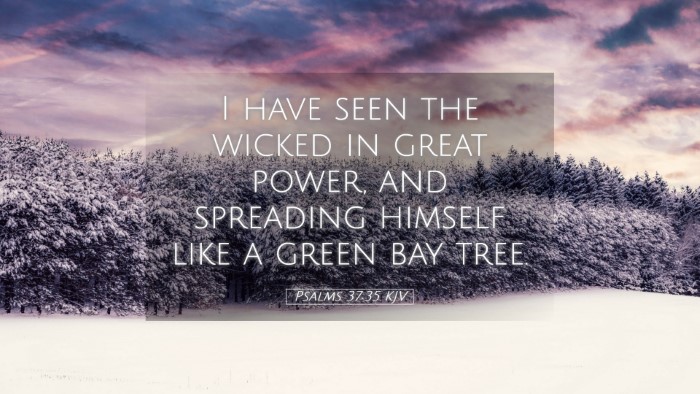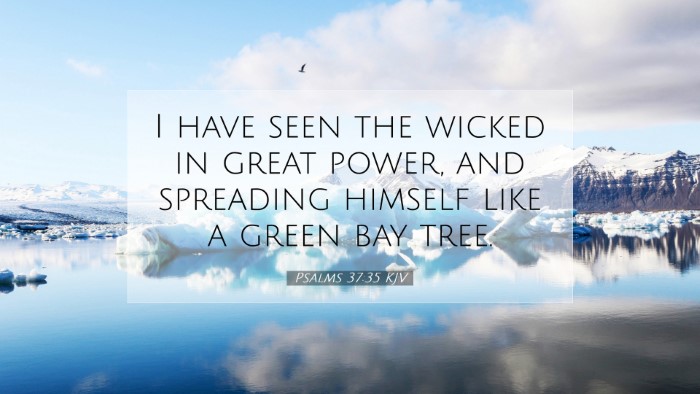Commentary on Psalm 37:35
Verse Text: "I have seen the wicked in great power, and spreading himself like a green bay tree."
Introduction
Psalm 37 reflects the conflict that believers face when observing the prosperity of the wicked contrasted with the struggles of the righteous. In verse 35, the psalmist observes the apparent success of the wicked, likening them to a flourishing tree, which invokes a deeper reflection on the transient nature of such prosperity.
Exegesis of the Verse
This verse presents two vivid images: the "wicked" and the "green bay tree." The term "wicked" refers to those who are unrighteous and act contrary to God's will. The psalmist notes their "great power," suggesting a momentary authority and influence that can overshadow the righteous community.
The phrase "spreading himself like a green bay tree" suggests a deceptive robustness and vigor, akin to a healthy, verdant tree that might invoke a sense of admiration. Yet, inherent in this vivid imagery is the underlying truth that such flourishing is temporary and ultimately illusory.
Insights from Matthew Henry
Matthew Henry remarks on this verse by emphasizing the troubling observation of evil triumphing in the world. He notes that despite the flourishing of the wicked, the psalmist does not lose trust in the Lord’s ultimate justice. Henry contrasts the temporary power of the wicked with the enduring faithfulness of God, pointing towards a final reckoning.
Henry states that wickedness can appear to prosper and grow, much like a tree that stands out amidst its surroundings. However, he reminds readers not to be overwhelmed by this sight but to maintain faith that justice will prevail in God's timing.
Insights from Albert Barnes
Albert Barnes offers a detailed analysis of the "green bay tree," noting its characteristics as a symbol of prosperity that is ultimately deceptive. He highlights that while the wicked may seem successful and their actions may temporarily bear fruit, the reality remains that this prosperity can lead to spiritual corruption.
Barnes encourages believers to look beyond outward appearances, asserting that the true fate of the wicked is not found in their temporary successes but in their eternal consequences. He urges the faithful to trust in God's sovereignty and to remember that the apparent 'success' of the wicked is superficial and fleeting.
Insights from Adam Clarke
Adam Clarke complements the observations made by others by focusing on the metaphorical implications of the verse. He notes that the "green bay tree" signifies both vitality and a potential danger; just as a green bay tree can provide shade and refuge, it can also smother other life around it.
Clarke warns that the prosperity of the wicked can lead to complacency among the righteous, encouraging them to dig deep into their faith rather than be tempted by the allure of worldly success. He exhorts believers to observe the wicked without envy and to be anchored in their relationship with God.
Theological Implications
This verse invites deep theological reflection on the nature of justice, righteousness, and the sovereignty of God. The concept of the wicked prospering raises essential questions for pastoral care and teaching. It reminds the church to guide believers effectively in navigating despair when faced with injustice.
Understanding the psalmist’s perspective also offers hope—despite the apparent flourishing of the wicked, spiritual truths declare that God's justice will not be thwarted. The transition from observing wickedness to focusing on God's promises is crucial in aligning one's heart with divine truth.
Practical Applications
- Encouragement in Trials: Pastors and leaders can use this verse to encourage believers who feel overwhelmed by the prosperity of the ungodly. It serves as a reminder to stay steadfast in faith.
- Perspective on Success: This psalm invites individuals to reconsider the definition of success, aligning it with faithfulness to God rather than worldly achievements.
- Warning against Complacency: The flourishing of the wicked is a warning against complacency among believers. They must remain vigilant and rooted in Scripture.
- Affirmation of God's Justice: The assurance that God will ultimately deliver justice provides solace to congregations and individuals grappling with difficult situations.
Conclusion
Psalm 37:35 serves as a poignant reminder of the transient nature of wickedness and the lasting power of God’s righteousness. Through the insights of Matthew Henry, Albert Barnes, and Adam Clarke, this verse serves not only as a reflection on the apparent success of the wicked but also as a call to remain steadfast in faith and trust in divine justice.
For pastors, theologians, and students, this commentary invites deeper exploration of the relationship between human observation and the unshakeable truths of God, urging them to guide believers with hope and clarity in a confusing world.


